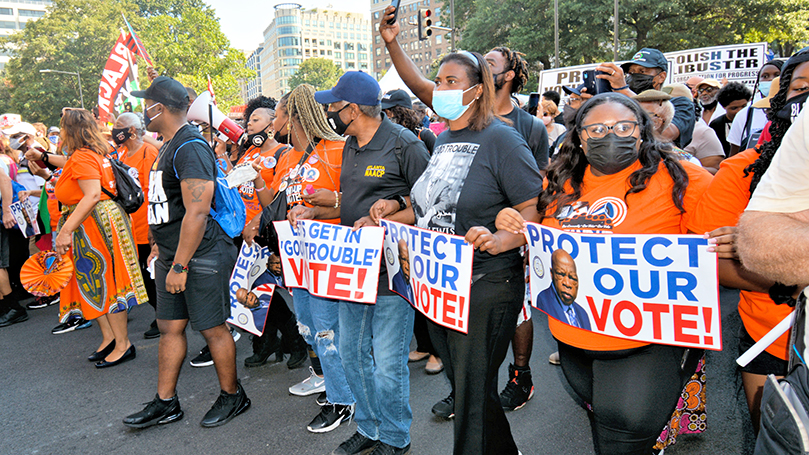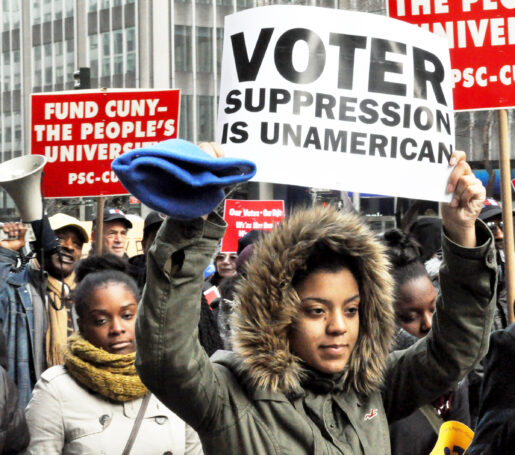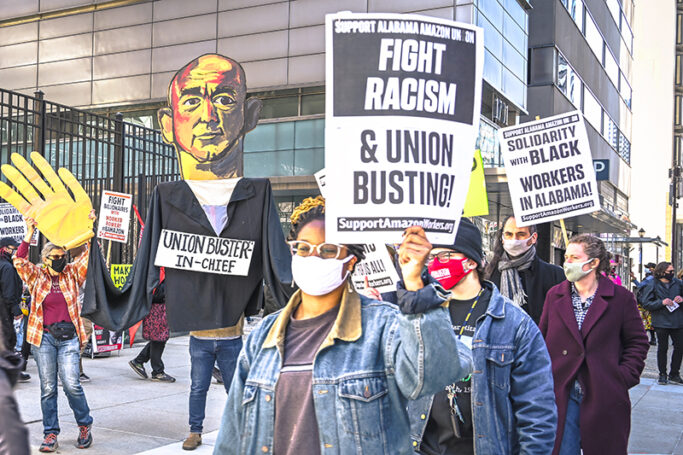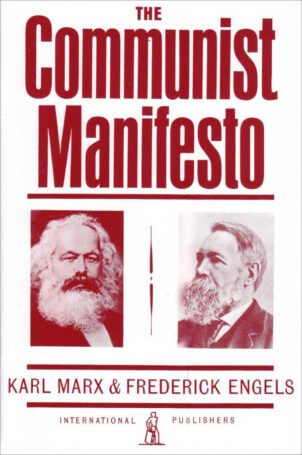
If you go outside right now and talk to your neighbors, people on the street, or almost anywhere nearby, and ask them how they feel about the current political landscape in the United States, many will convey a bleak outlook. Indifference to the U.S. political process is widespread, and not by accident. Low participation rates are not the result of some “secret cabal” or “deep state.” Rather, they result from the normal functioning of bourgeois democracy itself, in which various contending classes (among whom billionaires dominate) struggle to utilize apparatuses of the state to create economic and political change in their respective interests.
The inefficiencies of bourgeois democracy help maintain a system of exploitation. For example, many candidates might express their “solidarity” for U.S. workers, while proposing surface level reforms. Later, these reforms are frequently stalled by bureaucracy, the intervention of lobbyists, or an obstructionist politician. This often takes place in the Senate, which, from its start, was consciously designed to protect large landowners and place a check on the more democratic body of Congress—the House of Representatives. At the moment, Joe Manchin and Krysten Sinema have joined with Republicans in playing this role, particularly by protecting the filibuster.
With someone to point the blame at, some legislators will choose to wring their hands rather than adding pressure on their colleagues, perhaps later promising to solve the problem after their reelection! At other times, those who had vigorously supported progressive reforms during a period of gridlock, later vacillate under big business pressure when voters give them a majority. Without sufficient ideological arms, large numbers are left feeling confused and hopeless, choosing to abandon the process altogether. But this despair can be defeated. A mass approach to education on political economy, Marxist dialectics, private property, class struggle, and the state can help create the antidote.
The problem with political participation in the U.S.
Political participation in the United States has been reduced to the public as such: Every 2 to 4 years, bright banners and television commercials for politicians running for elected office appear before the public. Hoping to improve their own material conditions, voters choose among the available candidates, selecting those they believe will best represent their interests, though in most cases, the options have been made available by corporate donations.
More often than not, whichever candidate wins will make weak or limited efforts to fulfill their campaign promises, or even turning 180 degrees on certain issues.
Despite the Republican Party’s Southern Strategy of dividing the multiracial working class (which united to defeat the slavocracy and Jim Crow rule in the South) by appealing to religious nationalism and bigotry toward oppressed peoples, the majority of working class people do not hold these reactionary views—and perhaps others could be turned away from racist ideas with a progressive program. In response to the big business lurch toward fascism, a large working class and small-d democratic majority has aligned behind the Democratic Party to stave off efforts to overturn democratic gains.
There is a major contradiction within this alignment, however. The Democratic Party, although slightly more progressive, is still a party of big Capital. As voting alone does not always improve material conditions for workers, it is no wonder this disappointment can turn to apathy.
Many working class people do not vote because of the limitations and perceived futility of the electoral system, the promotion of ruling class ideas, and voter suppression.
Several factors contribute to the perceived uselessness of voting. One votes for a candidate who promises to improve their material conditions. If the individual candidate fails or under delivers, many assume all failures are due to the candidate as an individual, or perhaps the party they associated with, or ran against. Some elected officials or Democratic Party leaders are progressive in words but enable fascistic tendencies in Congress. The DNC’s decision to fund some anti-abortion candidates serves as one example.
Many people view individual candidates as being separate from the institutions and economic systems they are a part of, not seeing them as being part of a larger system that cannot be changed by voting alone. Many also believe that the U.S. has the best system of democracy in the world, and that the only issue is getting the right person into office.
The ruling class helps promote these ideas. Under bourgeois democracy, scientific research is often funded and conducted by capitalist institutions, and the major media outlets are also big business ventures. Many textbooks used in our classrooms are from decades past, riddled with outdated information, or omitting much of what should be considered essential knowledge, including our own history of struggle.
The right wing project of banning books in schools that have even the slightest progressive overtones is designed to lead many (particularly young, white, cis heterosexual men) workers into a fascist culture. “Critical-race theory” and “The LGBT Agenda” act as boogeymen, as do charges that the “liberals” want to “brainwash” our children into being gay or transgender, or by, heaven forbid, enlightening them on the realities of systemic racism. This is perfect for the GOP. After all, why worry about getting rid of “inconvenient” books when the people will burn the writings themselves?
The ultra-right in the United States is quickly taking over local school boards to push these agendas in the name of “saving the children.” Conveniently, this frothing rhetoric is opening up the path for private school vouchers, which once again places the responsibility of education in the hands of the oppressors.
 Also part and parcel of bourgeois democracy is voter suppression, and the struggle against it. When the U.S. Constitution was ratified in 1788, voting rights were restricted to white, male property owners.
Also part and parcel of bourgeois democracy is voter suppression, and the struggle against it. When the U.S. Constitution was ratified in 1788, voting rights were restricted to white, male property owners.
Constitutional amendments expanding the right to vote to those without property, for Black people, women, and young adults were added only as a result of working class and oppressed people’s struggles.
It took the U.S. Civil War and the Civil Rights movement to establish the voting rights that exist today, and still, there is the suppressed vote of millions of undocumented immigrants who are denied a pathway to citizenship. Each time people fought for the right to vote, the ruling class swung back hard in the form of poll taxes, literacy tests, and other repressive measures. Today they continue with minimal voting centers being placed in communities of color, voter ID laws, and various forms of intimidation.
In response to past working class and democratic victories, the ruling class has developed other tactics. Voter registration purges in the hundreds of thousands, suddenly closing hundreds of polling locations—as we saw in the 2020 general election in Texas, campaigning against mail-in ballots, and gerrymandering are some of the chosen methods of voter suppression still used today.
However, since the U.S. working class and people have won new rights and electoral powers, this means important changes can be made, and the overall course of class and democratic struggle in the U.S. has proven this. This is a threat to the ruling class; a politically independent electorate is unacceptable to them.
There is yet another contradiction. Corporations’ public relations departments are now forced to consider the potentially negative effects on their bottom line if they fail to acknowledge the equal rights of Black, Latine, Asian, Indigenous, LGBTQ+, and other oppressed communities. This is shown by their public recognitions of Pride month, Juneteenth, or other popularly accepted commemorations of the history of progressive struggle in the U.S. Historically, most corporations have publicly aligned against these communities. In essence, they still do (Starbucks removing gender-affirming healthcare coverage for union members comes to mind). But they are also fearful of that working people will become even more organized and determined to take power from them, and rely on continued suppression of the vote to prevent this from happening. This leads to “Big Bluff.”
The big bluff
Looking back at what led to popular struggles and progressive change in the past and comparing them to today, we see that the U.S. working class and people have developed their own political power, in large part through the fight for universal suffrage. This creates a significant problem for the U.S. ruling class, since directly restricting these rights after they have been won would destroy the illusion of capitalist democracy. The United States purports itself to function on the basis of the most democratic rule of the people, despite the fact that, as has already been pointed out, the original drafters of the Constitution intended to protect the interests of a minority: European, private property-owning men.
“Voting and involvement in the legislative process is a major medium of change, but by no means the sole method.”
Is that not how the system still functions? While Republicans mainly play the role of obstructing social progress, many Democrats also seek reforms that will not significantly challenge property rights. What then, should we do to help develop working class power in the United States? If we look at our successful historical examples of change, voting and involvement in the legislative process is a major medium of change, but it is by no means the sole, primary, or most reliable method. For the overwhelming majority, voting is their first foray into political participation, and a step toward developing their power over the state apparatus. Some will read this and roll their eyes. “Voting is useless!” they may think, “This sounds like Democrat tailism!”. In some senses, yes, voting is useless. Voting alone will not win the revolution. Voting alone will not defeat fascism. There is only one path that can wrest political supremacy away from the bourgeoisie in this country, and that is mass participation simultaneously within government, and the building of independent working class organization outside of it.
Working class power also expresses itself through massive strikes and unionization efforts, which over the years have been met with capitalist class violence. Workers who organized their workplaces have done so at great risk to their very lives—whether by direct, outright murder, or by indirect consequences of unemployment, lack of healthcare, or unsafe working conditions.
These collective actions are why Republicans and some Democrats spend such a massive amount of effort and resources on voter suppression. Unions today have been shouting from the mountaintops that we must secure voting rights for the general population. Unions are a form of class organization that give working people the capability to act collectively in their own self-interest, and the extreme right has them in their cross hairs. Would anyone be surprised if they tried to make right-to-work a constitutional amendment? Securing voting rights will help working people create a political landscape where unionizing is easier, and union rights are better protected.
This is an absolute must if we are to develop the power necessary to confront a fascist menace sponsored by big business. CPUSA member and NY YCL leader Justine Medina, also a leader in the Amazon Labor Union fight, has reported that, under the Biden administration, the National Labor Relations Board has “been the most cooperative it has ever been in 40, maybe 80 years.” This provides evidence that a vote for a candidate who will make the political landscape more friendly to unions is a strategic one.

But only when the overwhelming majority has gained experience in various strikes, boycotts, nonviolent protests and civil disobedience, coordinated and working together, will we be able to defeat not only the extreme-right section of big business that controls the GOP, but also the big business interests dominating the Democratic Party leadership, moving in the direction of a mass political party formed by and for the working-class which can establish working class power. This, however, is not possible without a struggle to defend and expand union rights and voting rights.
To better understand the situation, we must strategically analyze the situation from the position of the ruling capitalist class. It begs the question: if voting is useless, why do the bourgeoisie spend such a large amount of money on suppression?
In the earlier mentioned acts of desperate voter suppression, the ruling class has shown us this: voting can and does produce political power, and the billionaires are willing to spend copious amounts of money to stop the overwhelming masses from participating in the political process. They never intended for us to do so in the first place.
Today, in addition to concrete but hidden means of voter suppression, the ruling class relies on our inefficient “democracy” as a form of “soft” voter suppression. An inefficient government that appears immutable induces apathy, especially in the face of endless exhortations to “just vote!” Voter turnout in U.S. general elections has never broken much above 65%. This is likely linked to a low rate of union membership.
By way of contrast, voter turnout and political participation is significantly higher in countries where the level of working class organization and class and socialist consciousness is also higher. In Cuba, 78.6% of the population participated in the writing of its new Constitution. Even in Germany, which despite being a capitalist ruled country, but one where social democratic parties have much greater influence, voter turnout in the 2021 federal election reached 76.6%. This suggests that the working class in these countries has more developed rights and an easier time voting and participating in the political process.
In addition to fighting more direct methods of voter suppression, raising the unionization rate and level of class and socialist consciousness in the U.S. would go a long way toward addressing the problem of low voter turnout.
If a democracy is defined as rule by the people, why then, do we call ourselves a democracy when only a little over half of the country participates in the Presidential election? How could this be the case, even with the looming fascist threat represented by Trump and his ilk?
Billionaires run the government inside and out. Not until we achieve working class power will we be able to call ourselves a true “democracy.” Class struggle is like tug-o-war. It will not be a linear progression towards revolution.
In addition to sustained assaults on the U.S. labor movement and the Communist Party in the latter half of the 20th century, apathy on the part of many toward the political process has functioned as a form of soft voter suppression. It is another kind of attack on the U.S. working class and people. However, in recent years, voter registration and turnout has been steadily increasing. This is a sign that progressive forces are building the fight back. Currently, the ruling class is still depending on both “soft” and “hard” voter suppression. The thought of every member of the U.S. working class and people marching to the polls has them shaking in their boots. They have hedged their bets on our inactivity in the political process of participation. This the “Big Bluff.”
How the masses move history
Karl Marx and Friedrich Engels famously wrote in the opening salvo of The Communist Manifesto that “The history of all hitherto existing society is the history of class struggles.”
 Later in the pamphlet they predicted, “The proletariat will use its political supremacy to wrest, by degree, all capital from the bourgeoisie, to centralize all instruments of production in the hands of the State, i.e., of the proletariat organized as the ruling class; and to increase the total productive forces as rapidly as possible. … These measures will, of course, be different in different countries.”
Later in the pamphlet they predicted, “The proletariat will use its political supremacy to wrest, by degree, all capital from the bourgeoisie, to centralize all instruments of production in the hands of the State, i.e., of the proletariat organized as the ruling class; and to increase the total productive forces as rapidly as possible. … These measures will, of course, be different in different countries.”
Commenting on the nature of the state, they argued that “Political power, properly so called, is merely the organized power of one class for oppressing another,” a concept that would later be further developed by Lenin in State and Revolution.
Marx and Engels made it clear that working class power over the state must be won to create socialism.
They also made it clear that the path to power will be different in different countries. In China, this struggle took place in conditions of violence due to imperialist invasion and civil war. The country also had an extremely underdeveloped economy and a weak military and ruling class.
Mao explained that the counterrevolutionary forces were much more greatly developed in Europe, and as a result, armed struggle could not break out in the West as it did in China. Nonviolent struggle has been successful in recent U.S. history because the ruling class has enormous capacity for the murder, suppression, and surveillance of the working-class.
Where most start as nonviolent, some revolutions end in bloodshed and armed conflict. Many “leftists” see violence as the only path to revolution in the United States. This is a form of adventurism which will only serve federal agents’ looking for something interesting to report to their captains. It also assumes the revolutionary potential of the U.S. working class and people will remain static and ineffective compared to those of the Global South, when they, too, are exploited by capitalism. This line of thinking abandons Marxism and the inevitability of the working class to rise up against the capitalist class. Even if a violent uprising against capitalist rule in the United States were the only option, it would not be possible to draw masses of people into such a struggle and win at this time.
A way out
So then, here in the United States, what are we to do?
Massive, overwhelming participation of the population in every dimension of the class and democratic struggle is the only way to defeat the capitalist ruling class in the political arena. We need to help develop this mass participation.
“We must stand with the masses of the people, joining hands with as many people as possible to advance working-class struggle and participation in the political process.”
This includes voting and building get-out-the-vote and voter registration drives, unionizing, developing political relationships in our local communities, creating pro-worker media and educational classes, conducting mutual aid, attending and organizing protests and marches, advancing the peace movement, and supporting tenant strikes. We must stand with the masses of the people from the bottom up, like we have through our participation with the Poor People’s Campaign, joining hands with as many people as possible to advance working-class struggle and participation in the political process. Taken together, this is ‘Voting Plus’.
We must improve our organizing skills and capacity as the Communist Party, strengthening our local on-the-ground cadres as much as possible. This will help facilitate unity between all progressive forces.
Above all else, we must contribute to left-center unity to defeat the ultra-right, exhausting every tool available in our tool box.
Of course, we can’t fight for a better life while only shoving our noses in books and papers. We have to get to work! The working class and oppressed peoples of the earth have a world to win!
The opinions of the author do not necessarily reflect the positions of the CPUSA.
Images: Voting Rights March (Edward Kimmel, CC BY-SA 2.0); December 10 march for voting rights (Michael Fleshman, CC BY-SA 2.0); Demonstration to support Amazon Labor Union (Joe Piette, CC BY-SA 2.0); Communist Manifesto, International Publishers


 Join Now
Join Now